Human rights legislation serves as a crucial framework for safeguarding fundamental rights and freedoms, protecting individuals from abuse and discrimination. By influencing national laws and international agreements, it establishes standards for equality and justice, shaping societal norms and government policies. Effective enforcement mechanisms are essential for upholding these rights, operating at both national and international levels to ensure accountability and provide avenues for redress.
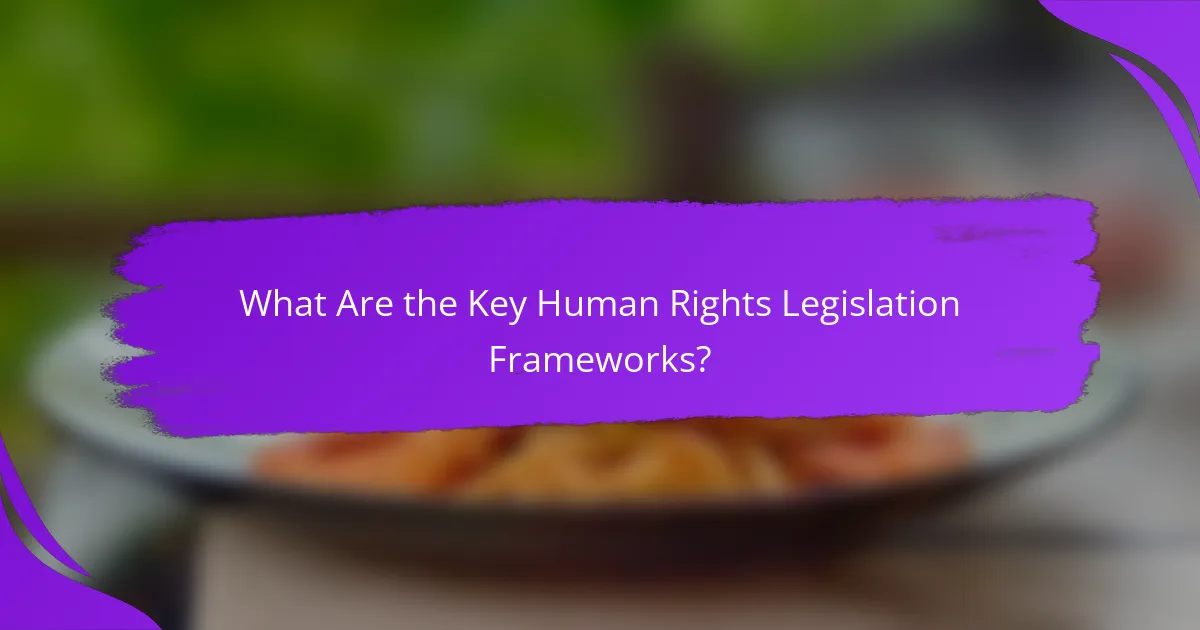
What Are the Key Human Rights Legislation Frameworks?
Key human rights legislation frameworks establish fundamental rights and freedoms that protect individuals from abuse and discrimination. These frameworks guide national laws and international agreements, ensuring accountability and promoting justice globally.
Universal Declaration of Human Rights
The Universal Declaration of Human Rights (UDHR), adopted by the United Nations in 1948, outlines basic rights and freedoms that all humans are entitled to, regardless of nationality, ethnicity, or religion. It serves as a foundational document for international human rights law.
The UDHR includes rights such as the right to life, liberty, and security, as well as freedom of expression and assembly. While not legally binding, it has inspired numerous treaties and national constitutions worldwide.
International Covenant on Civil and Political Rights
The International Covenant on Civil and Political Rights (ICCPR) is a key treaty that commits its parties to respect and ensure civil and political rights for individuals. Adopted in 1966, it complements the UDHR and is legally binding for signatory countries.
Rights protected under the ICCPR include the right to a fair trial, freedom from torture, and the right to privacy. Countries that ratify the ICCPR are required to report on their compliance and can be held accountable by the UN Human Rights Committee.
European Convention on Human Rights
The European Convention on Human Rights (ECHR), established in 1950, aims to protect human rights and fundamental freedoms in Europe. It is enforced by the European Court of Human Rights, which hears cases brought by individuals against member states.
The ECHR covers rights such as the right to life, prohibition of torture, and the right to a fair trial. Member states are obligated to comply with the Court’s rulings, which can lead to significant legal and policy changes within those countries.
American Convention on Human Rights
The American Convention on Human Rights (ACHR), adopted in 1969, aims to promote and protect human rights in the Americas. It establishes the Inter-American Commission on Human Rights and the Inter-American Court of Human Rights to oversee compliance and adjudicate violations.
Key rights under the ACHR include the right to personal liberty, freedom of thought and expression, and the right to a fair trial. Countries that ratify the ACHR are expected to adhere to its provisions and can be subject to scrutiny by the Inter-American system.
African Charter on Human and Peoples’ Rights
The African Charter on Human and Peoples’ Rights, adopted in 1986, emphasizes the importance of both individual and collective rights in Africa. It is monitored by the African Commission on Human and Peoples’ Rights, which reviews state compliance and addresses violations.
This Charter includes rights such as the right to self-determination, the right to development, and the right to a healthy environment. It reflects the unique cultural and social context of African nations while promoting universal human rights standards.
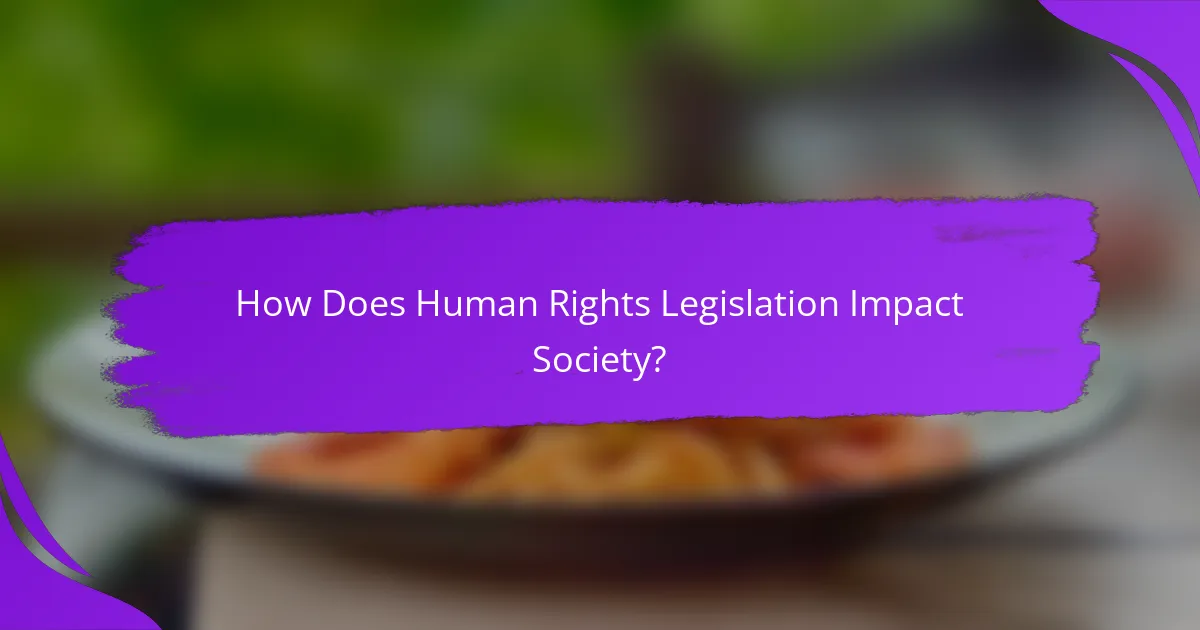
How Does Human Rights Legislation Impact Society?
Human rights legislation significantly shapes society by establishing standards for equality, protection, and justice. It influences social norms and government policies, fostering an environment where individuals’ rights are recognized and upheld.
Promotion of Equality and Non-Discrimination
Human rights laws promote equality by prohibiting discrimination based on race, gender, religion, or other characteristics. These laws encourage inclusive practices in workplaces, schools, and public services, ensuring everyone has equal access to opportunities.
For example, legislation like the Equality Act in various countries mandates that employers provide equal pay and opportunities regardless of gender. This not only benefits individuals but also enhances overall productivity and social cohesion.
Protection of Vulnerable Groups
Human rights legislation plays a crucial role in safeguarding vulnerable groups, including children, the elderly, and minorities. By establishing legal frameworks, these laws ensure that marginalized populations receive necessary protections and support.
In practice, this may involve specific regulations that protect refugees or individuals with disabilities, ensuring they have access to essential services and are treated with dignity. Governments are often required to implement policies that address the unique challenges faced by these groups.
Enhancement of Social Justice
Human rights laws enhance social justice by addressing systemic inequalities and promoting accountability. They provide mechanisms for individuals to seek redress against violations, fostering a culture of respect for rights.
For instance, legal provisions that allow for class action lawsuits enable groups to challenge discriminatory practices collectively. This not only empowers individuals but also encourages institutions to adopt fairer practices, contributing to a more equitable society.
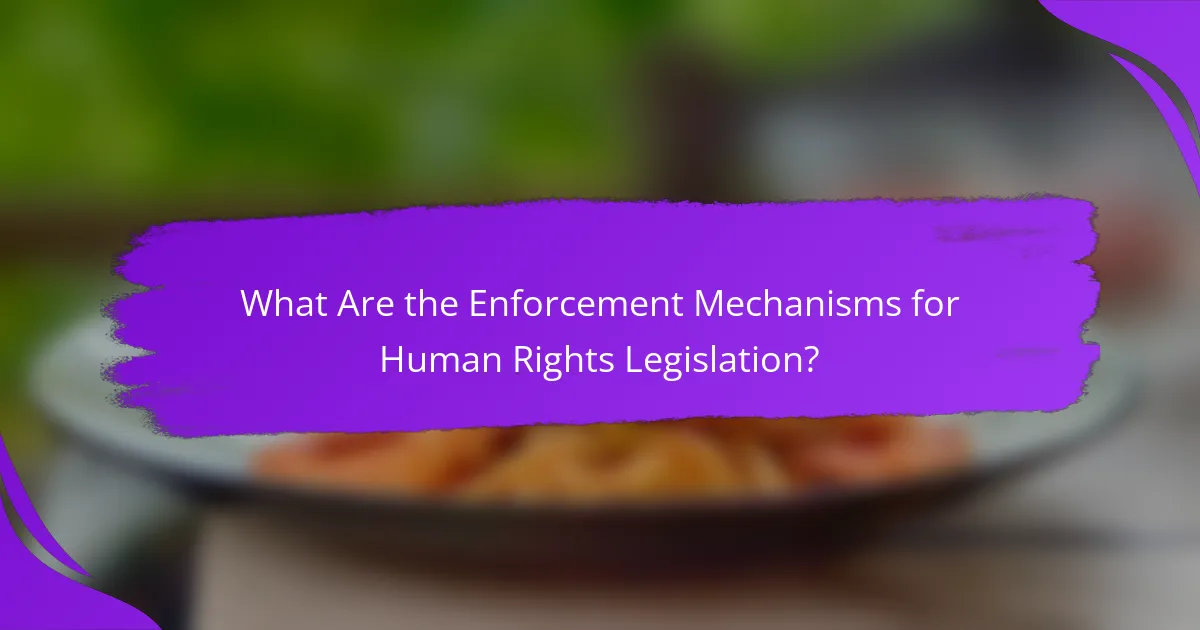
What Are the Enforcement Mechanisms for Human Rights Legislation?
Enforcement mechanisms for human rights legislation include various systems and institutions designed to uphold and protect human rights standards. These mechanisms operate at both national and international levels, ensuring accountability and providing avenues for redress.
National Courts and Tribunals
National courts and tribunals play a crucial role in enforcing human rights legislation by adjudicating cases related to violations. Individuals can bring complaints against the state or private entities, seeking justice and remedies for infringements. The effectiveness of these courts often depends on their independence, accessibility, and the legal frameworks in place.
For example, in many countries, constitutional courts may hear cases involving fundamental rights, while specialized human rights tribunals can address specific issues such as discrimination or freedom of expression. It is essential for citizens to understand the procedures and requirements for filing complaints in their respective jurisdictions.
International Human Rights Courts
International human rights courts, such as the European Court of Human Rights, provide a platform for individuals and states to address violations of international human rights standards. These courts can hear cases after all domestic remedies have been exhausted, offering a higher level of scrutiny and enforcement.
These courts typically require a formal application process, and decisions can lead to binding rulings that compel states to comply with human rights obligations. The effectiveness of these international mechanisms often hinges on the willingness of states to implement the court’s decisions.
Ombudsman Institutions
Ombudsman institutions serve as independent entities that investigate complaints regarding human rights violations and maladministration by public authorities. They provide a crucial link between citizens and the state, facilitating access to justice without the need for formal legal proceedings.
These institutions can recommend actions to rectify violations and improve public administration practices. Their effectiveness often depends on their mandate, resources, and the public’s awareness of their services.
Non-Governmental Organizations
Non-governmental organizations (NGOs) play a vital role in the enforcement of human rights legislation by monitoring violations, providing legal assistance, and advocating for policy changes. They often serve as watchdogs, bringing attention to abuses and mobilizing public support for reform.
NGOs can also assist victims in navigating legal processes and may engage in strategic litigation to challenge systemic issues. Collaboration between NGOs and other enforcement mechanisms can enhance the overall effectiveness of human rights protection efforts.
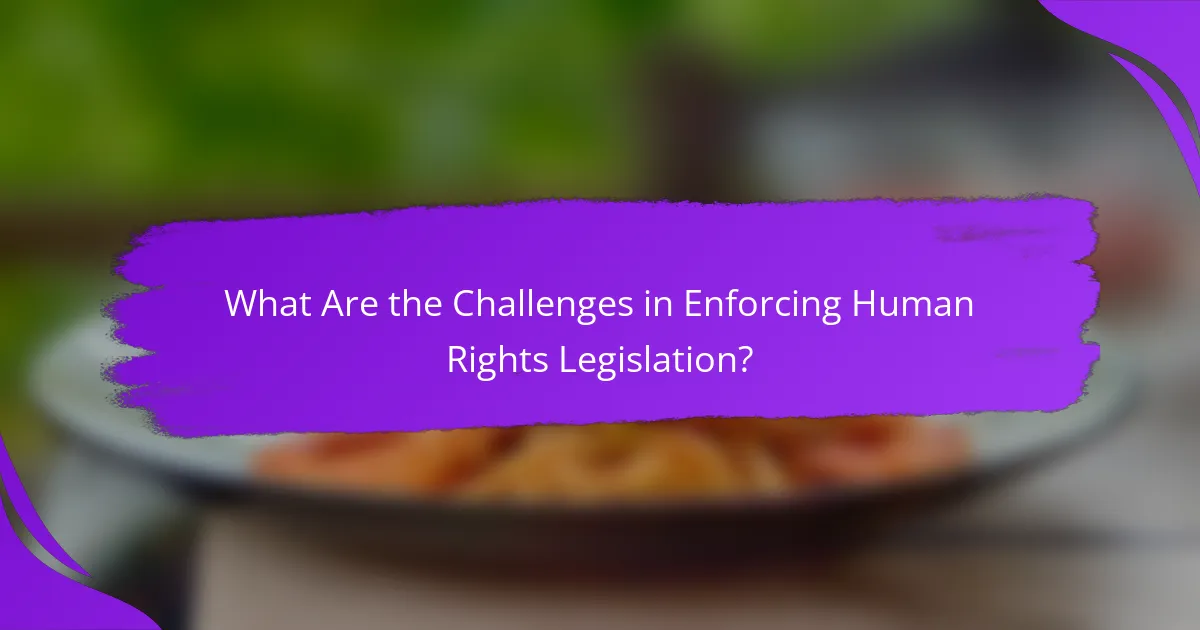
What Are the Challenges in Enforcing Human Rights Legislation?
Enforcing human rights legislation faces several significant challenges that hinder its effectiveness. Key obstacles include a lack of political will, insufficient resources, and widespread corruption, which collectively undermine the implementation and protection of human rights.
Lack of Political Will
A lack of political will is a primary barrier to enforcing human rights legislation. When government officials and leaders do not prioritize human rights, laws may exist on paper but lack practical application. This can stem from various factors, including fear of backlash, political instability, or competing interests.
For example, in some countries, leaders may prioritize economic growth over human rights, leading to inadequate enforcement of laws designed to protect citizens. Advocacy groups often emphasize the need for public pressure to encourage political leaders to take human rights seriously.
Insufficient Resources and Funding
Insufficient resources and funding are critical challenges that affect the enforcement of human rights legislation. Many human rights organizations and government bodies lack the financial support needed to carry out investigations, provide legal assistance, or conduct awareness campaigns.
In developing countries, this issue is particularly pronounced, where budgets may be constrained, and competing priorities can limit the allocation of funds for human rights initiatives. For effective enforcement, it is essential to secure adequate funding from both government and international sources.
Corruption and Impunity
Corruption and impunity significantly undermine the enforcement of human rights laws. When law enforcement and judicial systems are compromised, individuals may feel discouraged from reporting abuses or seeking justice. Corruption can lead to a culture of silence, where perpetrators of human rights violations face no consequences.
To combat this, it is crucial to establish transparent mechanisms for reporting abuses and to hold accountable those in power. Civil society organizations play a vital role in monitoring and exposing corruption, advocating for reforms that enhance accountability and protect human rights.
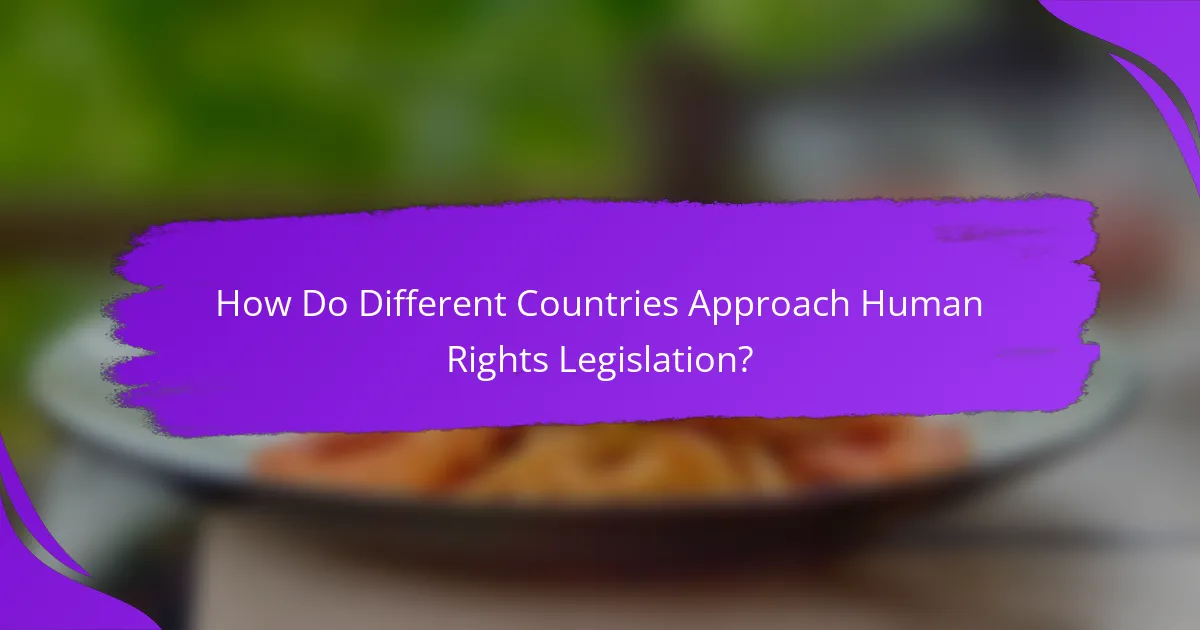
How Do Different Countries Approach Human Rights Legislation?
Countries vary significantly in their approaches to human rights legislation, influenced by historical, cultural, and political factors. While some nations have comprehensive legal frameworks protecting various rights, others may lack enforcement mechanisms or prioritize certain rights over others.
Comparative Analysis of the US and EU Approaches
The United States and the European Union represent two distinct approaches to human rights legislation. The US primarily relies on constitutional protections and judicial interpretations, emphasizing individual liberties. In contrast, the EU adopts a more integrated approach, with binding treaties and regulations that promote social and economic rights alongside civil liberties.
In the US, the Bill of Rights and subsequent amendments outline fundamental freedoms, but enforcement can vary by state. The EU, through instruments like the European Convention on Human Rights, ensures member states adhere to common standards, allowing for collective accountability. This difference often leads to varied outcomes in areas such as privacy rights and anti-discrimination laws.
For instance, while the US has seen significant debate over freedom of speech versus hate speech, the EU has stricter regulations against hate speech, reflecting its commitment to social harmony. Understanding these differences is crucial for those navigating human rights issues in either region.


